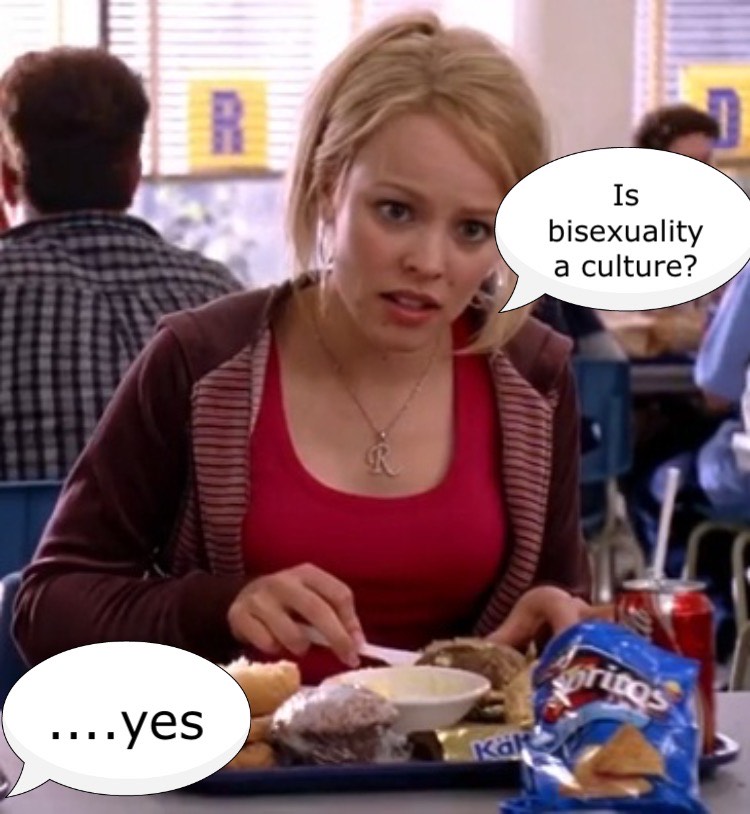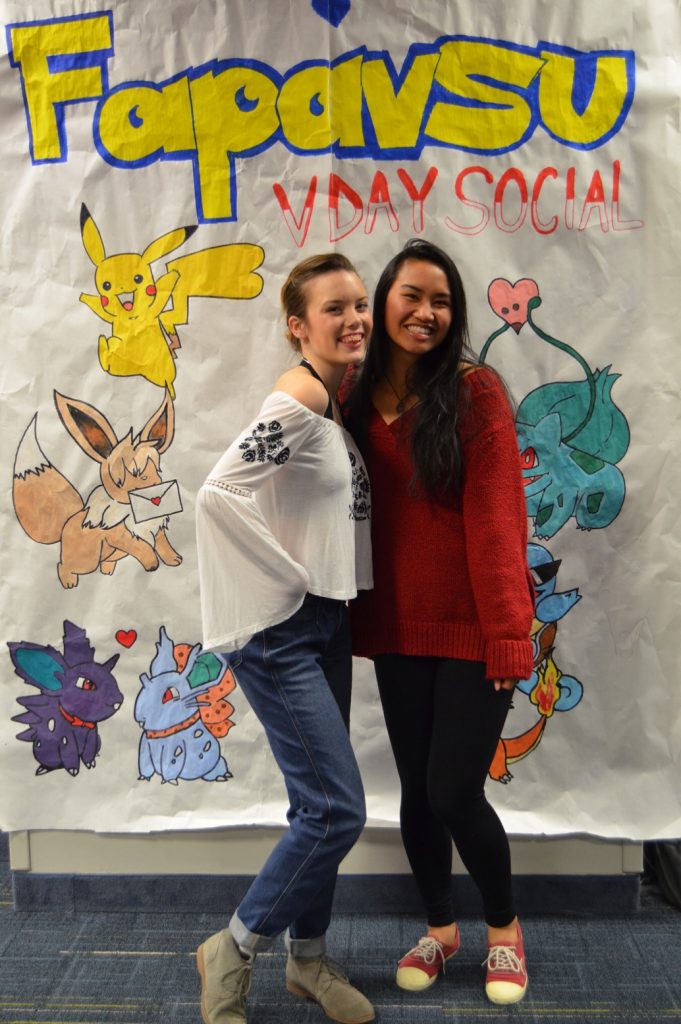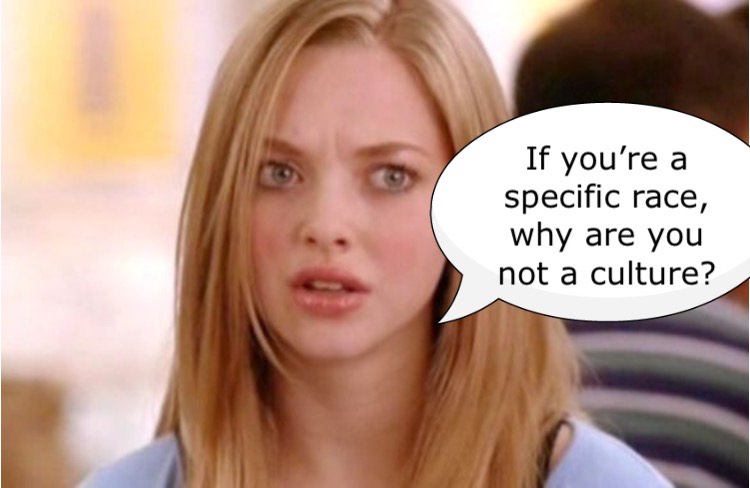Blog 10:
I feel as though I have developed by abilities to understand hardships through this course. I have learned how to write academically and informally about comparing cultures. Understanding the causes and reasons for a person to act the way they do has been an eye opening experience and has allowed for a deeper appreciation of social sciences.
If I were to take the course again I would dedicate more time to my assignments so they could discuss a wider variety of cultures rather than the few that I am familiar with. Nonetheless I will look back on the information in this course as a way to communicate with those different from me in all aspects, not just cultures!
This picture below is a wonderful picture of the celebration of cultures coming together. This was Filipino American and Vietnamese American celebration of valentines day!
Blog 9:
This course has taught me how to think about myself, my culture, and differentiate between personal and cultural experiences. These three values can be seen in each blog.
Simply comparing the first blog to the most recent (Blog 1 to Blog 8), it seems a transformative experience has happened. In the beginning, focus seemed to be on definitions and clarifying factual means. The most recent blog, Blog 8, discussed not only a personal experience in my culture and my friends’ cultures; but also how they all interconnect and are differentiated.
Being given the opportunity to understand so many different cultures other than the ones I have been exposed to has been wonderful. Seeing my roommates response to a values exercise, and compare with the analyses and the values then further compared to her cultural norms has been so interesting and intriguing.
In this course, I really enjoyed learning about cultural masculinity and femininity. I took a feminism course, but seeing how it translates into specific cultures and analyzing possible reasons felt less subjective research.
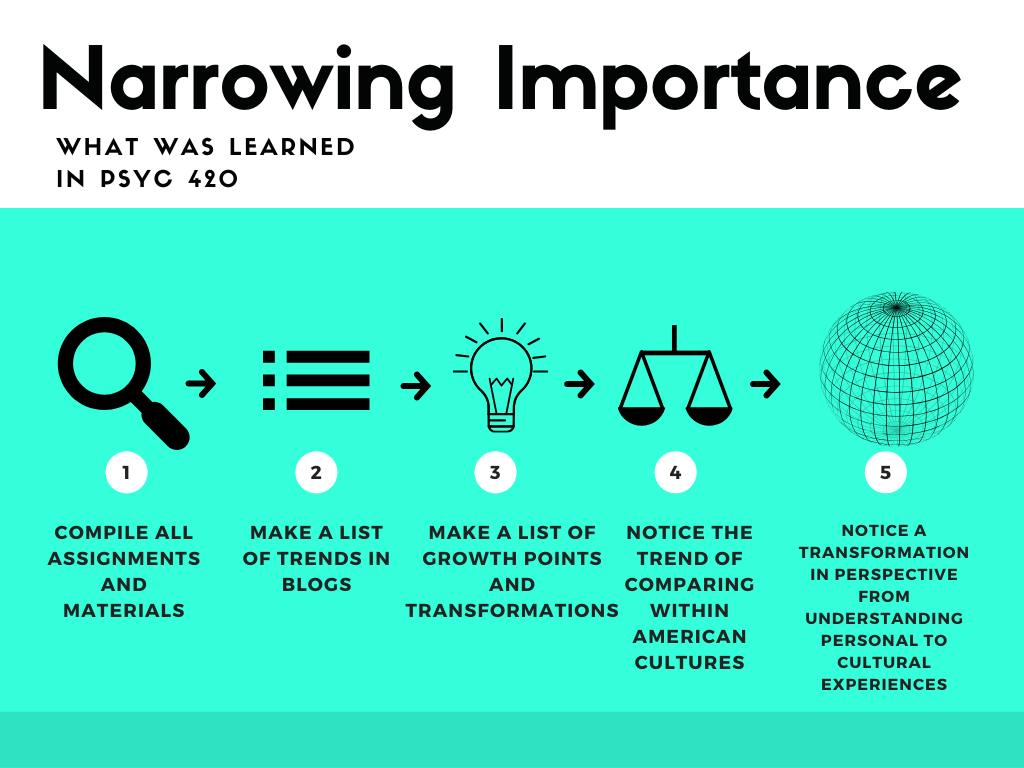
Blog 8:
The easiest culture to analyze is Filipino or Filipino-American culture. Only because I have the most exposure. Since we are in isolation currently due to the coronavirus, and I see mostly social media expression rather than facial expressions, I loved reading the section on analyzing emoticons. I find this completely accurate!! My boyfriends mom (with whom I am very close to and view as a second mother) texts and posts much differently than my own mother. Both are in their 40s, as well as my friends post differently amongst different groups.
In terms of my mother (Irish) and my boyfriends mother (Filipino), my mother uses much less emojis and she uses simple smiley faces. His mother, on the other hand, uses TONS of emojis, lots of “…” and expressive markings “?!?!!!?” and every single kind of emoji possible (now also including memojis). She uses them more than I do!
In relation to my friends, almost all of my Filipino or Filipino-American friends use “(>.>)” “(UwU)” and “^.^”. This always just seemed like a cute thing that came from my friends being qwerky, until I realized after this post that they are my only friends that do this!
Universality and cultural display definitely apply here. Filipino-American culture is something I hold close to my heart, and have grown to understand. Emotions are encouraged to be shown and it is seen as the basis of communication. I find myself appreciating more and more how much my friends and future family handle emotion. They do not let it control them, but they are expressive and empathetic and earnestly try to deal with them in a healthy way.
Below is a picture of the Filipino American Student Association news letter with expressive pictures all depicting a full face!

Blog 7:
Fairy tales in general are extremely interesting to me. I studied German for all of high school and one of my favorite units was translating and discussing the Grimm Brothers’ stories. What was most interesting was how the direct translation meant a completely different thing than the versions Disney or in general American literature display. In Grimm Brothers’ the morals were very clear, meant to mostly protect and teach survival lessons, and were gruesome and often scary. The goal was to protect children, not to entertain them. This does fit with general German culture, since they are often known to be very straight forward people who are altruistic and believe in the better of the group.
I think fairytales in German literature is more feminist, honestly, and has more significant value to society. American fairytales often disappoint with a moral being a cliche centered around what is most desirable in a mate or how to act in public (Cinderella gets married after being coy and patient, the Little Mermaid gets married and stays with a prince, Snow White gets saved by true loves kiss). These stories have a much different emphasis in German culture. Cinderella’s step sisters get their feet cut to try to fit the shoes, and their eyes pecked out because they tried to share in Cinderella’s fortune. The capabilities of the heroines are much larger than the romantic element of the princes. I really admire that. The negative qualities of what NOT to be are just as emphasized (if not more) than what someone SHOULD be.
In terms of cultural elements, this also makes sense because I think Americans tend to look more into what a woman (or person in general) should be rather than what they shouldn’t. People try to look like models and be perfect, as opposed to many Germanic people I know who just want people to not hurt each other, to not steal, etc.
In terms of roles on young audiences I think that explains why American youth often have a larger rebellious stage than Germanic youth. Americans often have more to fight back against and feel as though they should be more unique, whereas my friends in their German youth were more understanding of why the rules put in place were necessary. These societal values of what a person should and should not act like are detrimental for some people. It is impossible to follow the American “guidelines” to be a princess without genetic miracles, but it is relatively easy for a person to not act out of greed or malicious intent. German fairytales also often reaffirm there are negative consequences for bad actions, which I find aren’t often affirmed in American literature for youth.
I personally positively identify with Mulan, and always have. Her strength and stubbornness to do what is right and just was always empowering. While others might not have seen the amazing things she had planned, she followed through and ended up saving everyone. Mulan is one of the only Disney movies that came out when I was little that really encouraged a girl to be all that she can be (as opposed to dainty and obedient).
The picture below shows some of my amazing and empowering female friends. We have very different backgrounds, sexualities, careers, ethnicities, economic statuses growing up, and are at very different stages in life. I couldn’t be prouder of my friends and their constant perspective on the world.
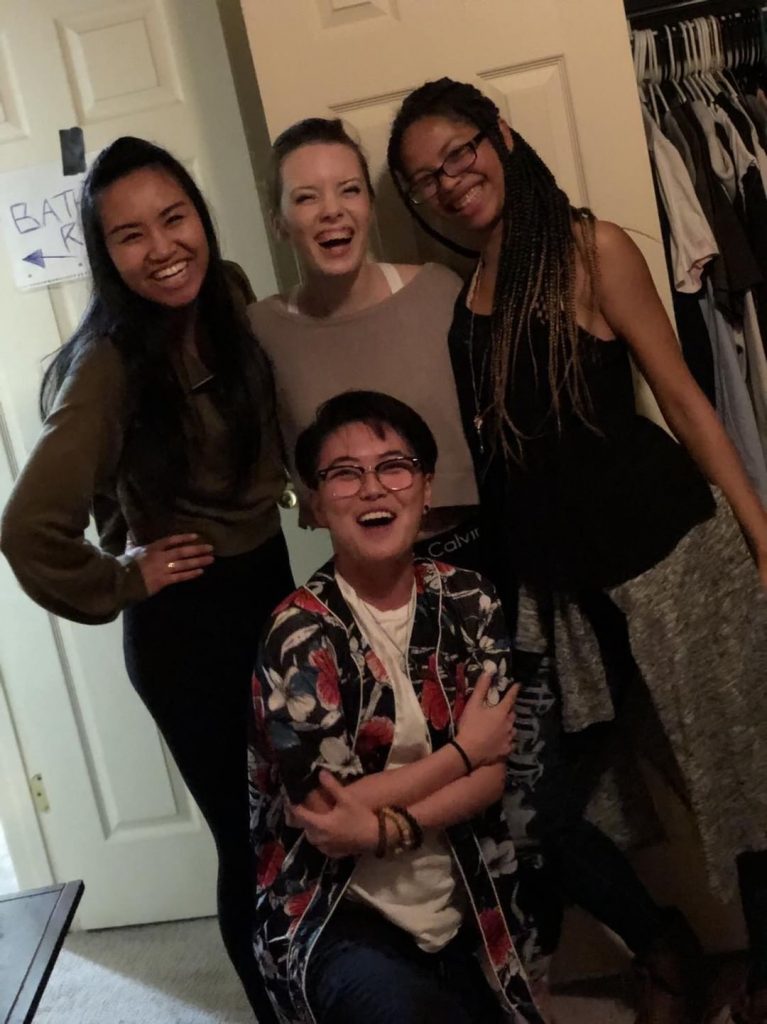
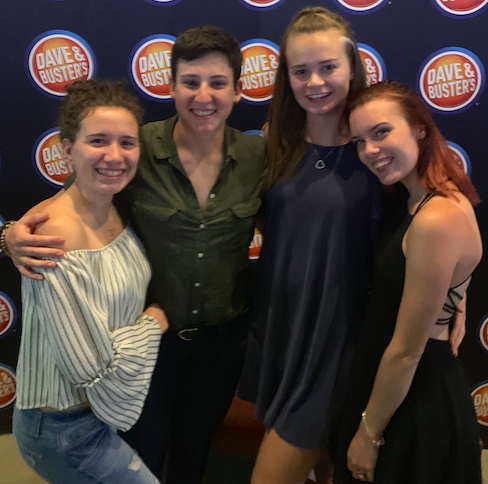
Blog 6:
Self – Determination Theory has always felt like a relatively stable assessment tool in my life. I find that I am very intrinsically motivated and always have been. My need for autonomy and control of everything in my life has played a huge role in my anxiety and learning to be more adaptive and need less control has been a large coping mechanism for me.
In terms relatedness I have struggled with interpersonal communication my entire life. My desire for affection is extreme but my ability to allow people in has been a large struggle for me. I am extremely passionate in academics, my career, my friendships and my hobbies. I believe this passion is my main drive for my motivation and excites me for my future. I try to channel all of my anxiety about the world into passion to elevate this feature as well.
Competence has always been something I struggle with as well. I desire to be the most competent person in all areas of my life, but my anxiety makes me feel otherwise. I am aware I often hypercorrect in this area but I believe it is not a bad thing. As long as I can cope with my anxiety I am able to learn many skills and gain a plethora of knowledge. Alongside my anxiety is my general curiosity for the world and love of learning.
My mother was very encouraging of intrinsic motivation when I was young and always encouraged me to explore, create, get excited about things I learned or found, and taught me perseverance. I must give her credit for my intrinsic motivation now and ability to be academically oriented! 🙂
Below is a picture of me in dance. I use my anxiety in my competence to literally push my muscles more, I become very autonomous in my ability to create new movements and creations, and it is one of the only times I feel connected to people. I feel as though my relatedness increases tremendously in dance by the physical contact and nonverbal communication. I think dance has encouraged my intrinsic motivation for the best.
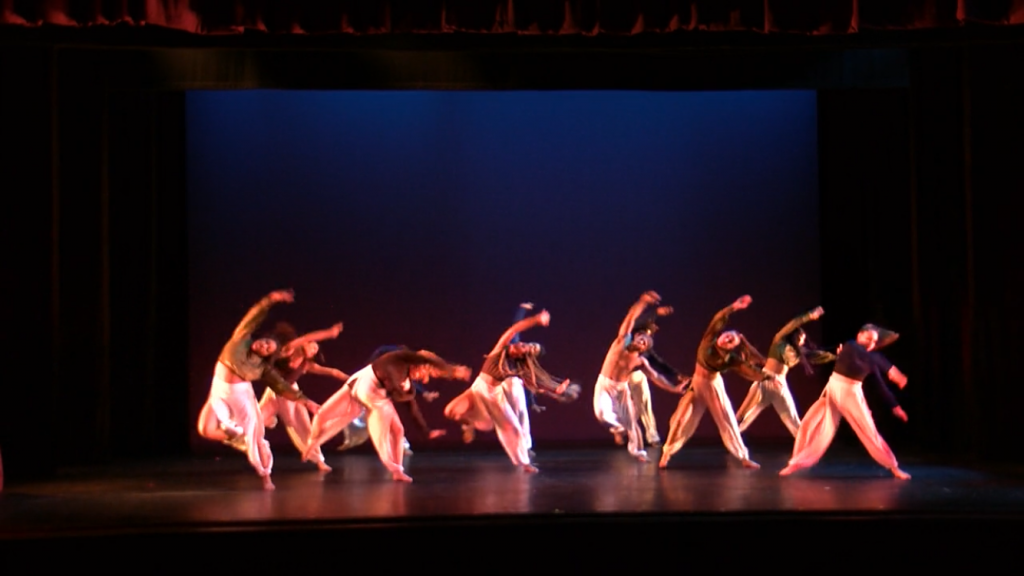
Blog 5:
- I am curious.
- I am creative.
- I am passionate.
- I am trusting.
- I am anxious.
- I am empathetic.
- I am wild.
- I am adventurous.
- I am persistent.
- I am bold.
I am a person of undefinable qualities, constantly seeking knowledge and exploration of the unknown. I desire freedom and adventure, but value intimate moments with the people I love. My independence and self sufficiency provide me comfort.
Independent statements, or statements that are not dependent on context, are literally all of my answers. They all are personality traits that have no relation to others around me. I find this interesting given my harsh childhood and personal trauma. I believe I was raised to believe self sufficiency is desirable, so that you can always get out of a bad situation with anyone if the unfortunate happens. I never thought of my descriptions and the way I view myself to be more than just adjectives on the ways I am by human nature. After even a brief analysis I can see the ways in which my experiences have in a way caused me to compartmentalize everything, even how I view myself.
I think my artistic side of my personality explains why I crave the “be unique” perspective of the world. Through music, dance, research, almost everything valuable in my life, I am told to bring a new perspective or a different topic to the table. I am encouraged to think in new and creative ways and to try to stand out among others, rather than work in a collective group and be a follower of others.
It is much easier to think of independent self proverbs for me. In fact, I have trouble thinking of proverbs that encourage interdependent self except what my mom mockingly told me when I was younger (i.e. if you have nothing nice to say don’t say anything at all), or jokes on my favorite T.V. shows (i.e. CONFORMITY: it is the different penguin that gets left out in the cold). My mother always told me to be myself no matter what, stay true to my heart, etc. I think it really becomes apparent my mothers goals as well and I think it also describes why I had so much social problems growing up. I remember my mom saying things like “you don’t have to be nice, but you have to be civil,” which probably attributed to a shift in how I view friendships and the values of interpersonal communication. I strongly value intimacy in friendships, but I still struggle with it tremendously in terms of how I can become close to others.
It’s also amusing how my favorite quote (below) is also an independent ideal. It is not only independent, but it almost escapes the need to have others around. When ironically I crave to be with intimate friends.
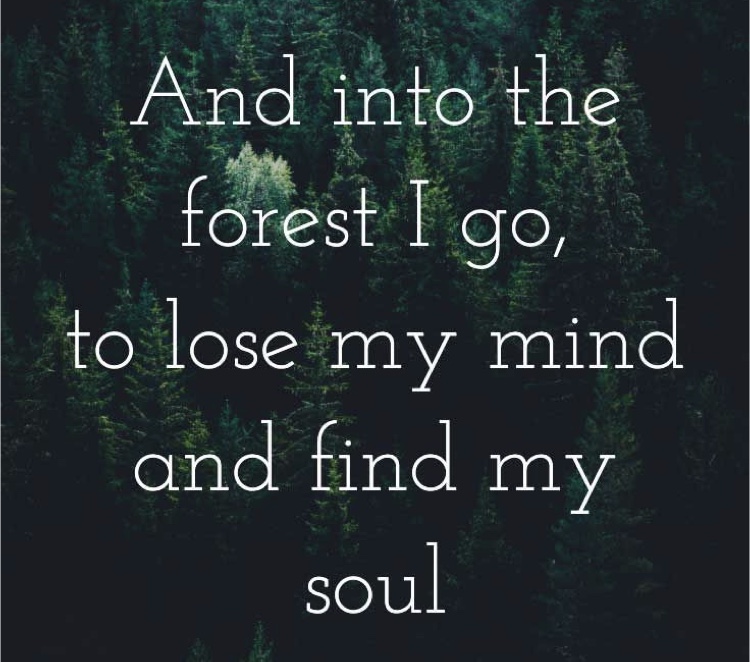
Blog 4:
This test was nothing like I predicted. I studied the information in the books, but I felt extremely unprepared with what I studied. I focused on including all of my assignments and reviewing how they all were integrated rather than focusing solely on textbook information.
I scored much lower than I had hoped, which makes sense when you couple severe testing anxiety, ADHD, and a lack of preparedness. To familiarize myself with the material and get used to the formats of tests, I created a quizlet set for each chapter. Prior to exams, I will use different study tactics to test myself through quizlet (in hopes of decreasing anxiety). I will also use the flashcards when I am walking around on campus to reinforce information throughout the course, rather than only reviewing the week prior.
This assignment was interesting because it showed something I routinely struggle with, while giving me time to process how I can make it better. I previously used Quizlet but I forgot about the additional functions (like testing yourself, matching, open ended questions, and the “learn” feature).
Below is a picture of the set I made for chapter 5.
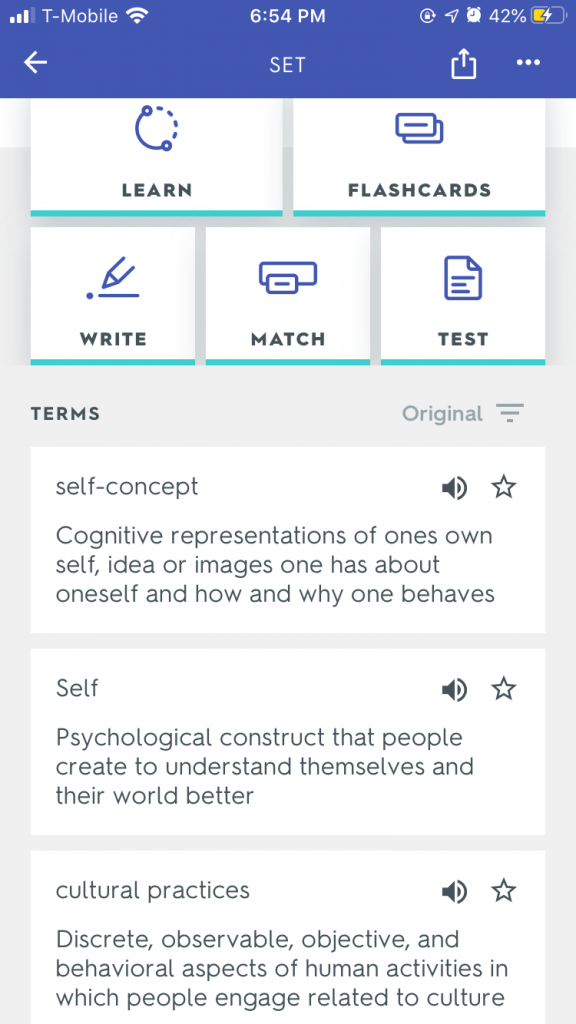
Blog 3:
The NEO test yielded very interesting results. I misunderstood the directions and began with rating myself on high, average and low in each category (rather than sorting my results later into each category). Since this mistake, I had a rather interesting analysis.
In terms of accuracy, I think the combination of results shows an accurate portrayal of my personality. I am off the charts high in neuroticism and openness. Which makes sense because I have extreme anxiety, which I try to combat by trying new things. For instance, I have been in the hospital multiple times for anxiety, but I have also fully immersed myself in other cultures, learned new languages, love travel and have a deep passion for both art and science. I believe well rounded people are the most level headed and aspire to learn a lot about many things. I get bored if I am in the same routine constantly.
I got polar opposite results in extraversion and agreeableness. This also makes sense after reading the descriptions. I am highly outgoing and high spirited, but I prefer to be alone and with a few close friends. For instance I love helping people, but if I help more than two people in one day at work I won’t leave my house for the rest of the night because I am exhausted.
In agreeableness, I am compassionate and good natured, but I am hardheaded, competitive and express my anger directly to people. This is best seen in my dance choreography. I love seeing people’s differences and ideas, but I cannot stand being told what to do, have trouble in collaboration, and tell people what I am thinking. This sometimes comes off as more confrontational than it feels. I also constantly analyze how I can individually highlight everyone, and prefer for everyone to have their own section that comes together as one larger piece. I am good natured in that I never try to hurt anyone’s feelings or disregard their opinions, and genuinely try to understand others’ point of view.
I got the same results in conscientiousness, which is moderate. I can identify with this by my belief in moderation and valuing other people’s time and efforts, alongside my own.
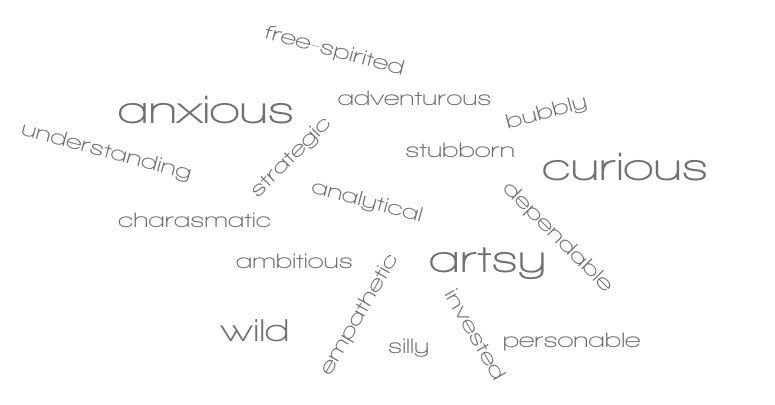
This title represents my personality because I believe I am very complex and seemingly contradictory, but I am very meticulous in my way of life. I chose the word chaos also as a reference to the physics chaos theory that states one small change can exponentially impact any bigger picture. The idea of having an arrangement in chaos theory is also a reference to my belief that everything happens for a reason.
Blog 2:
I believe all values reflected in cultural society are important to me, and all lie on a relative scale on how I personally believe they should be applied in my personal (ideally healthy) functional lifestyle. The most important values in my career pursuits would be future orientation and work orientation. These both can easily get out of hand and become stressors in the life of a researcher, but I hope to be able to keep them as positive values in my life.
I think inherently research must be geared towards how the benefits can be applied in the future; however, future orientation does not mean an automatic depreciation of the past. A healthy balance and moderation of energy spent on this value should lead to a prosperous present at any moment. Since goal setting is such a large part of this value, I think it is one of my natural strengths that I work hard to continue. In my research I often must set goals and appreciate my personal accomplishments as I complete each one. That does not mean I am unable to stay in the present or that I am devaluing the past, but rather I am appreciating the beautiful culmination of the three interacting for the greater good.
Work orientation is an extremely important value to me, but is not something I would consider my strength. As a child of workaholics, I easily and quickly fall into the American attitude of constantly over scheduling activities that must have a purpose. I hope to learn how to work productively in an environment that is not anxiety-filled and is not overflowing with the feelings of pressure for time efficiency.
My University experience emphasizes these values of mine. After going to the hospital multiple times with anxiety related conditions, having seizure like panic attacks and constant medication adjustments, I realized I had to rethink my priorities and mental health. My first task was to explore the world because I had a passion for learning and a hunger for knowledge, not to get the perfect grades and worry about exactly where it will lead me. This passion was why I continued to pursue education in the first place, so I had to learn how to make it enjoyable rather than anxiety provoking.
My second large challenge in college was to continue to be goal oriented without hating myself if a goal changed or did not get met. Learning to readjust into a mindset of everything in moderation has changed my life and my health. I believe educational experiences and lessons are the core reasons why my values are important to me in the way they currently are.
Every positive influencing adult in my life has valued life in moderation, and the idea that pursuit of knowledge does not necessarily equate to a perfect number. I believe this led me to realizing that I should value my experiences alongside my education and find a way to combine the two, rather than choosing one or the other.
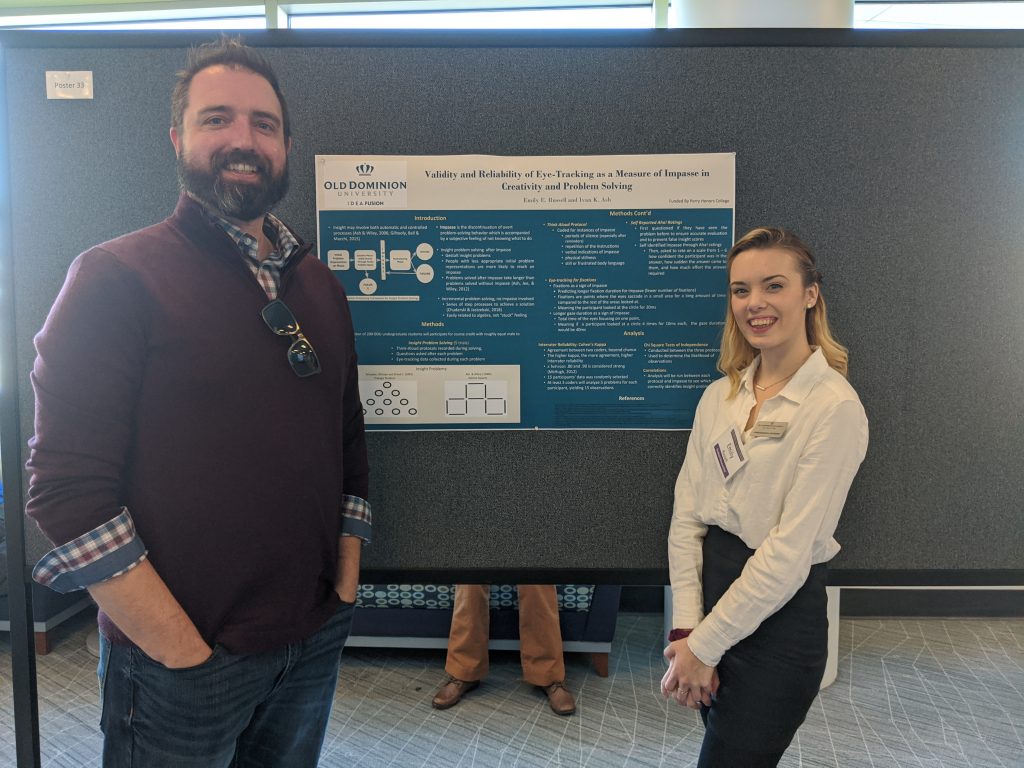
Blog 1:
Course objectives outlined in the syllabus will help me in my future by developing a better understanding of communication through cultures. I grew up here in Norfolk, which is a military town filled with a multitude of people from other cultures. My research driven undergraduate experience has taught me the importance of fully understanding information from as many angles as possible, so a deeper understanding of cultures should further develop my ability to understand why people act the way they do, difficulties in adjusting to new cultures and how to relate to people from vastly different cultures than me.
I hope to develop a broader understanding of people in general that I can take with me in my various travels abroad. In just the next six months I will be going to Honduras, Mexico, Belize and Thailand. I hope to be able to put the research learned in this course to application while abroad and better represent American citizens.
As a future spouse of a military member, I look forward to traveling to different parts of the country and outside of the country. I hope this course will improve my understanding so I can form genuine connections with people from other cultures in an informed way that can be informative and based on mutual understanding of hardships.
To do well in the course, I plan to try to see application with my Filipino American friends in the Filipino American Student Association and actively apply as much as I can from the course. I learn best when using information that I learn, so I hope the constant application of material will help my brain to permanently encode this information to long term memory. I also intend to have specific time in my weekly schedule to work on this course, to ensure I am fully cognizant of the information and not rushing last minute to finish the assignments.

